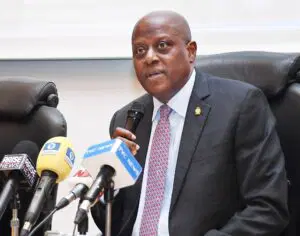The Central Bank of Nigeria (CBN) has reaffirmed the need for strong, stable, and resilient banks to achieve President Bola Tinubu’s target of a $1 trillion economy by 2030.
Speaking at the 36th CBN Seminar for Finance Correspondents and Business Editors held in Abuja, Deputy Governor of Corporate Services, Ms. Emem Usoro, emphasised that ongoing efforts to recapitalise banks are a vital step in realising this goal. Represented by Acting Director of Corporate Communications, Mrs. Hakama Sidi-Ali, Usoro said bank recapitalisation will empower financial institutions to fund large-scale projects and compete globally.
“As we work towards building a one-trillion-dollar economy, we must consider the recapitalisation of our banks to finance and power the economy,” she said. “Banks must be strong enough to support development projects and effectively carry out financial intermediation.”
She added that Nigeria’s current GDP stands at around $250 billion, indicating a significant gap that would require strategic planning, consistent policy direction, and the full engagement of economic stakeholders.
The global financial architecture, she noted, has evolved, particularly since the Trump administration in the U.S., making it crucial for Nigerian banks to align with global opportunities and risks through responsive policies.
In his presentation, Director of Banking Supervision at the CBN, Dr. Olubukola Akinwumi, explained that the recapitalisation strategy now focuses on helping banks meet their Cash Reserve Requirement (CRR) obligations and participate in infrastructure financing.
He said, “A well-capitalised bank can support large transactions and benefit from government initiatives such as infrastructure concessions. Stronger banks can lend more, especially to priority sectors like agriculture, manufacturing, and SMEs, which are engines of growth.”
Akinwumi stressed that these sectors remain central to the government’s development plans, as reflected in the 2025 national budget, which prioritises education, health, agriculture, and infrastructure.
Adding an industry voice, UBA Managing Director, Mr. Oliver Alawuba, urged greater trust in Nigerian banks, suggesting that part of the country’s external reserves be managed locally to build confidence and boost economic growth.
“We manage the reserves of other African countries. Nigerian banks should be trusted with at least 10 to 20 percent of our own reserves,” he said.
However, Alawuba raised concerns about the feasibility of reaching the $1 trillion goal, citing Nigeria’s current annual growth rate of 3.8 percent—far below the 10 percent minimum required to meet the target by 2030.
He called for synergy between fiscal and monetary authorities to support the financial sector in driving sustainable economic transformation.

Leave a Reply